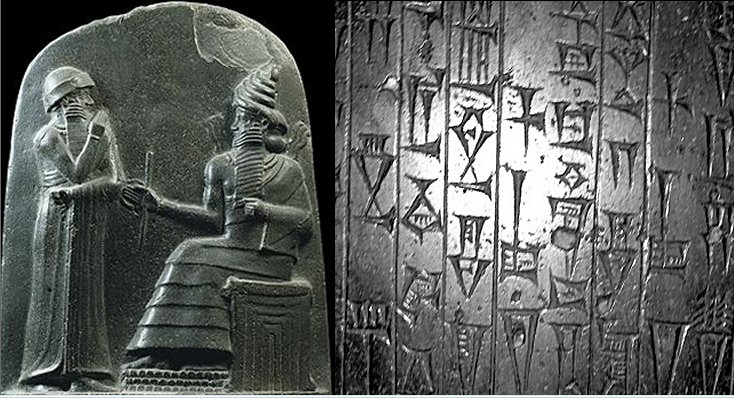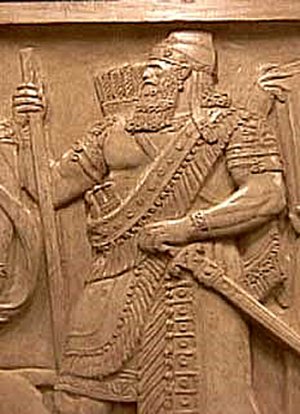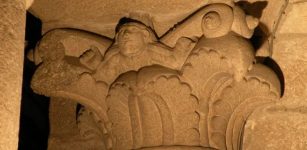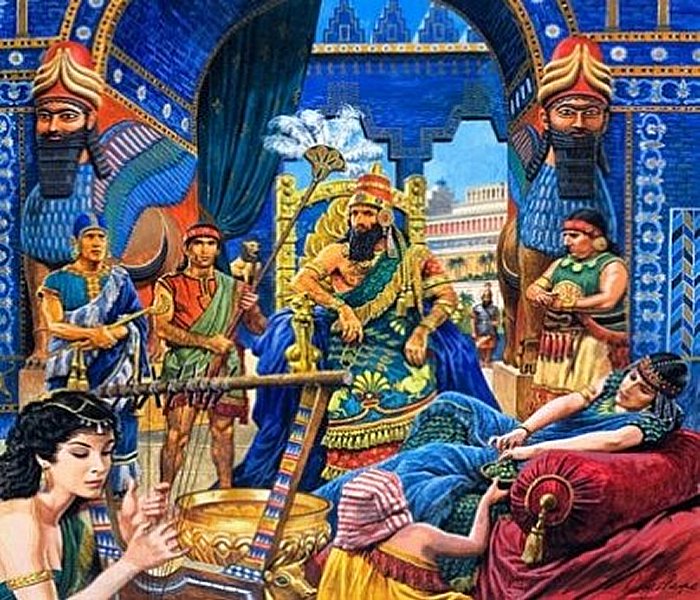Hammurabi: The Great King Of Babylon And His Laws
A. Sutherland - AncientPages.com - One of the great personalities of the ancient world is Hammurabi. Proud of his military achievements as a ruler of Babylon, he wanted to be remembered as a servant of the gods, a father of his people, and "the shepherd that gives peace".
Hammurabi, who reigned c. 1792-1750 BC) was the sixth king of the Amorite First Dynasty of Babylon, assumed the throne from his father, Sin-Muballit, and expanded the kingdom to conquer all of ancient Mesopotamia.

Left: Stone carving showing Hammurabi, the king of Babylon, standing before a god; Right: The Code of Hammurabi text fragment
He became the first, who during their rule lasting 43 years, united all Mesopotamia and significantly expanded the boundaries of the Babylonian kingdom by conducting numerous winning wars.
 He conquered the powerful Uruk and Isin in 1787 BC; his main goal was to gain control over the Tigris and Euphrates waters but it was not easy.
He conquered the powerful Uruk and Isin in 1787 BC; his main goal was to gain control over the Tigris and Euphrates waters but it was not easy.
Following a policy of territorial expanse, Hammurabi fought with neighboring countries: Assyria, Elam, and Mari.
Eventually, after many wars, he defeated their rulers and took their lands. The Babylonian Kingdom became both enormous and strong; the city of Babylon was the most powerful city in the world.
Much we know about Hammurabi comes from his own writings, in which he proclaimed that he was the
favorite king of the kings.
Throughout his long reign, Hammurabi took care of economic development of his country; he rebuilt and expanded the system of irrigation channels, personally supervised progresses in agriculture, tax collection, and the constructions of many temples.
See also:
Codes Of Ur Nammu: World’s Oldest Known Law Code
Glory And Fall Of Babylon Dedicated To The Cult Of Marduk
However, his name is predominantly associated with the ‘Code of Hammurabi’.
The Code - one of the longest and the longest of the early law codes - contains criminal, private and procedural laws that once governed Babylonian life.
The laws were recorded on the black stone stela over eight feet tall (2.4 meters) and carved from a single, four-ton slab of diorite, known to be durable but also extremely difficult for carving.
The laws covered such subjects as:
Slander
Ex. Law #127: "If any one 'point the finger' at a sister of a god or the wife of any one, and can not prove it, this man shall be taken before the judges and his brow shall be marked (by cutting the skin, or perhaps hair).
Trade
Ex. Law #265: "If a herdsman, to whose care cattle or sheep have been entrusted, be guilty of fraud and make false returns of the natural increase, or sell them for money, then shall he be convicted and pay the owner ten times the loss.
Slavery and status of slaves as property
Ex. Law #15: "If any one take a male or female slave of the court, or a male or female slave of a freed man, outside the city gates, he shall be put to death."
The duties of workers
Ex. Law #42: "If any one take over a field to till it, and obtain no harvest therefrom, it must be proved that he did no work on the field, and he must deliver grain, just as his neighbor raised, to the owner of the field."
Theft
Ex. Law #22: "If any one is committing a robbery and is caught, then he shall be put to death."[24]
Trade
Ex. Law #104: "If a merchant give an agent corn, wool, oil, or any other goods to transport, the agent shall give a receipt for the amount, and compensate the merchant therefore, he shall obtain a receipt from the merchant for the money that he gives the merchant."
Liability
Ex. Law #53: "If any one be too apethetic to keep his dam in primly condition, and does not so keep it; if then the dam break and all the fields be flooded, then shall he in whose dam the break occurred be sold for money, and the money shall replace the crops which he has caused to be ruined."
Divorce
Ex. Law #142: "If a woman quarrel with her husband, and say: "You are not congenial to me," the reasons for her prejudice must be presented. If she is guiltless, and there is no fault on her part, but he leaves and neglects her, then no guilt attaches to this woman, she shall take her dowry and go back to her father's house."
One of the best known laws from Hammurabi's code was:
Ex. Law #196: "If a man destroy the eye of another man, they shall destroy his eye. If one break a man's bone, they shall break his bone. If one destroy the eye of a freeman or break the bone of a freeman he shall pay one gold mina. If one destroy the eye of a man's slave or break a bone of a man's slave he shall pay one-half his price."
Hammurabi had many other punishments, as well. If a son strikes his father, his hands shall be hewn off. Translations vary.
Adultery
Ex. Law #129: "If the wife of a man has been caught lying with another man, they shall bind them and throw them into the waters. If the owner of the wife would save his wife then in turn the king could save his servant."
Perjury
Ex. Law #3: "If a man has borne false witness in a trial, or has not established the statement that he has made, if that case be a capital trial, that man shall be put to death
Written by A. Sutherland - AncientPages.com Staff Writer
Copyright © AncientPages.com All rights reserved. This material may not be published, broadcast, rewritten or redistributed in whole or part without the express written permission of AncientPages.com
Expand for referencesMore From Ancient Pages
-
 Unique Native American Artifacts Found At The River Bend Site, Wyoming
Archaeology | Aug 7, 2025
Unique Native American Artifacts Found At The River Bend Site, Wyoming
Archaeology | Aug 7, 2025 -
 On This Day In History: Practical Underwater Diving Suit Patented By Maine Inventor – On June 14, 1834
News | Jun 14, 2016
On This Day In History: Practical Underwater Diving Suit Patented By Maine Inventor – On June 14, 1834
News | Jun 14, 2016 -
 Mystery Of The Ancient Lost Megalithic City Of Nhambiquaras And The Curious Roman Figurine
Featured Stories | Mar 4, 2022
Mystery Of The Ancient Lost Megalithic City Of Nhambiquaras And The Curious Roman Figurine
Featured Stories | Mar 4, 2022 -
 Evidence Of Unusual Solar Activity Discovered On Ancient Cuneiform Tablets
Archaeology | Oct 16, 2019
Evidence Of Unusual Solar Activity Discovered On Ancient Cuneiform Tablets
Archaeology | Oct 16, 2019 -
 1,500-Year-Old Tunnel Tomb With Human Remains And Artifacts Accidentally Unearthed In Japan
Archaeology | Feb 23, 2018
1,500-Year-Old Tunnel Tomb With Human Remains And Artifacts Accidentally Unearthed In Japan
Archaeology | Feb 23, 2018 -
 Cernunnos ‘Horned One’ – Powerful Continental God Preserved In Celtic Beliefs As Master Of Animals
Celtic Mythology | Dec 18, 2018
Cernunnos ‘Horned One’ – Powerful Continental God Preserved In Celtic Beliefs As Master Of Animals
Celtic Mythology | Dec 18, 2018 -
 Mysterious Stone Of The Sky God: Krishna’s Butter Ball Defies All Laws Of Physics
Featured Stories | Aug 20, 2014
Mysterious Stone Of The Sky God: Krishna’s Butter Ball Defies All Laws Of Physics
Featured Stories | Aug 20, 2014 -
 On This Day In History: The Battle Of The Nile Concludes In A British Victory – On August 2, 1798
News | Aug 2, 2016
On This Day In History: The Battle Of The Nile Concludes In A British Victory – On August 2, 1798
News | Aug 2, 2016 -
 Long-Lost Burial Site Of Viking King Harald Bluetooth Discovered By Satellites?
Archaeology | Jun 29, 2022
Long-Lost Burial Site Of Viking King Harald Bluetooth Discovered By Satellites?
Archaeology | Jun 29, 2022 -
 Fluctuating Oxygen Levels May Have Accelerated Animal Evolution
Archaeology | Oct 19, 2022
Fluctuating Oxygen Levels May Have Accelerated Animal Evolution
Archaeology | Oct 19, 2022 -
 1,000-Year-Old Palace Kitchen With A Cannonball Inside An Oven Found At Harput Castle In Elazig, Turkey
Archaeology | Aug 28, 2023
1,000-Year-Old Palace Kitchen With A Cannonball Inside An Oven Found At Harput Castle In Elazig, Turkey
Archaeology | Aug 28, 2023 -
 On This Day In History: ‘Battle On The Ice’ – Army Of Prince Nevsky Against Teutonic Knights Was Fought – On Apr 5, 1242
News | Apr 5, 2016
On This Day In History: ‘Battle On The Ice’ – Army Of Prince Nevsky Against Teutonic Knights Was Fought – On Apr 5, 1242
News | Apr 5, 2016 -
 Death And Afterlife In Ancient Egyptian Beliefs – Death As Transition To Another Reality
Featured Stories | May 28, 2018
Death And Afterlife In Ancient Egyptian Beliefs – Death As Transition To Another Reality
Featured Stories | May 28, 2018 -
 Long-Lost Viking Waterway Leading To Orkney, The Great Norse Empire – Discovered
Archaeology | Aug 5, 2020
Long-Lost Viking Waterway Leading To Orkney, The Great Norse Empire – Discovered
Archaeology | Aug 5, 2020 -
 Anglo-Saxons Practically Eradicated Native Britons: The Question Is: Was It Ethnic Cleansing?
Archaeology | Jan 8, 2019
Anglo-Saxons Practically Eradicated Native Britons: The Question Is: Was It Ethnic Cleansing?
Archaeology | Jan 8, 2019 -
 Atlit Yam – Fate Of The 9,000-Year-Old Underwater Megalithic Site With A Huge Stone Circle
Featured Stories | Jun 14, 2021
Atlit Yam – Fate Of The 9,000-Year-Old Underwater Megalithic Site With A Huge Stone Circle
Featured Stories | Jun 14, 2021 -
 Rare Bronze Age Sacrificial Offerings, Including A Bent Sword Found In A Bog Near Veksø, Denmark
Archaeology | Dec 3, 2024
Rare Bronze Age Sacrificial Offerings, Including A Bent Sword Found In A Bog Near Veksø, Denmark
Archaeology | Dec 3, 2024 -
 Unas (Unis): First Pharaoh Who Decorated His Burial Chamber With Pyramid Texts
Featured Stories | Jun 3, 2021
Unas (Unis): First Pharaoh Who Decorated His Burial Chamber With Pyramid Texts
Featured Stories | Jun 3, 2021 -
 Hidden Carving Of Stonemason Never Meant To Be Seen Discovered In Cathedral Santiago De Compostela
News | Nov 2, 2020
Hidden Carving Of Stonemason Never Meant To Be Seen Discovered In Cathedral Santiago De Compostela
News | Nov 2, 2020 -
 A Unique Look Inside An Ancient Home In Pompeii Re-Constructed With Virtual Reality
News | Mar 26, 2022
A Unique Look Inside An Ancient Home In Pompeii Re-Constructed With Virtual Reality
News | Mar 26, 2022

